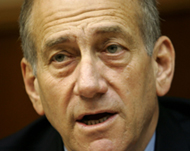Prisoners soften stance on Israel
Jailed members of Hamas and Fatah have developed a peace plan that accepts of a Palestinian state alongside Israel, Mahmoud Abbas says.

However, it was unclear whether Hamas, particularly the group’s leaders abroad, would back the proposals.
Until now Hamas has rejected international demands for it to renounce violence, recognise Israel and accept existing peace agreements.
The document was formulated by senior Hamas and Fatah members who are imprisoned by Israel and presented to the Palestinian leader on Wednesday.
Abbas, the moderate leader of Fatah, said he backed the draft document, which authorises him to lead peace talks with Israel.
“This document is very important. I adopt the position of those heroes,” he said late on Wednesday, referring to the prisoners.
“It includes a deep and realistic political vision that to a very large extent represents my point of view … and thus I adopt it.”
Senior Hamas officials were not immediately available for comment.
The news comes a few days after a senior Israeli official reportedly met several Palestinian prisoners, among them Hamas legislators, in two jails.
The Yedioth Ahronoth newspaper quoted a ministry official as saying Motti Zaken, an adviser on Arab affairs at the internal security ministry, met the men to “to assess their mood”.
Occupied territory
The negotiations were held in Israel’s Hadarim Prison, where Fatah leader Marwan al-Barghouti and Abdel Khaleq Natche of Hamas are serving their sentences.
 |
|
The paper calls for a Palestinian |
It was not clear whether Natche had the approval of the Hamas leadership abroad, including Syrian-based Khalid Mishaal.
The document calls for a Palestinian state “in all the lands occupied in 1967”, a reference to the West Bank, Gaza Strip and east Jerusalem.
Such an implied recognition of Israel would be a large policy change for Hamas, which remains committed to the destruction of the Jewish state.
Ehud Olmert, the Israeli prime minister, has said he is ready to withdraw from much of the West Bank to create an independent Palestinian state.
But he plans to keep large blocs of West Bank settlements and holy sites in east Jerusalem.
Israel withdrew from Gaza last year.
Mark Regev, the Israeli foreign ministry spokesman, said he was not familiar with the Palestinian talks and saw no need to comment on an internal Palestinian matter.
Continued resistance
The draft Hamas-Fatah deal does not renounce violence.
 |
|
Olmert plans to hold onto large |
Instead, it says that Palestinians will “focus their resistance on the lands occupied in 1967”.
Hamas has largely observed a truce since February 2005, but has refused formally to renounce violence.
The document will authorise Abbas to lead negotiations with Israel, based on what is referred to as “Arab legitimacy”, an apparent reference to an Arab peace initiative which calls for a two-state solution.
Any agreement will be put before the Palestinian parliament or submitted to a referendum of Palestinians everywhere.
Based on the programme, Fatah will join the Hamas government, the document said.
Tensions
Salah Bardawil, a Hamas legislator, said he had not seen the document, but that the views of the Hamas prisoners were considered important.
Tensions have been rising since Hamas defeated Fatah in legislative elections earlier this year.
Abbas, elected separately last year, has been in a power struggle with the Hamas-led government.
The rivalry erupted into violence between the sides in Gaza this week, killing three people and wounding a dozen others.
Hamas and Fatah are to hold talks in two weeks to try to settle their differences.